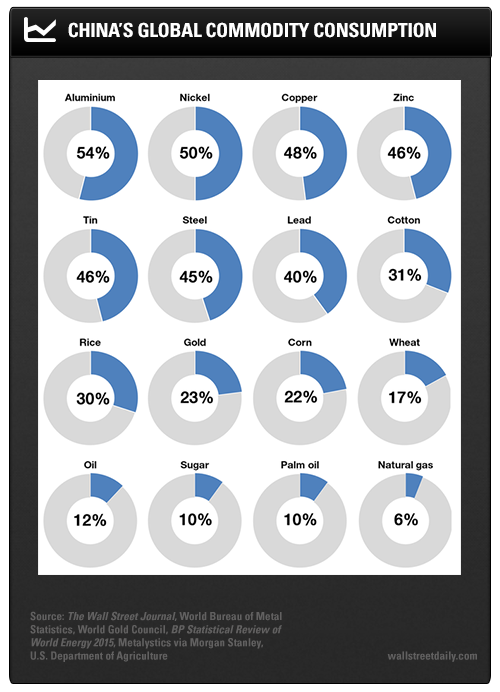August 11, 2015 was an important date if you follow the stock market. That was the day China devalued the yuan.
But from a geopolitical viewpoint, June 9 was much more important. That was the date Russian energy giant Gazprom (MCX:GAZP) agreed to sell oil to China in exchange for yuan instead of dollars.
This is a direct slap in the face of the decades-long dominant petrodollar.
The petrodollar was created in the early 1970s and was the brainchild of former Secretary of State Henry Kissinger and Saudi Arabia. You see, the United States agreed to protect the House of Saud with a commitment to its political and military security. In exchange, the kingpin of OPEC agreed that all oil sold would be sold solely in U.S. dollars.
So, if you don’t have U.S. dollars, you don’t have access to most of the world’s oil. That’s a nice way to “convince” other nations to hold dollars. Thus, the dollar stands as the world’s must-hold reserve currency.
Commodities and the Dollar
But China would like to change the dollar’s status. And, in its place, have the yuan be more widely accepted, with the hope that the yuan will eventually become the world’s new reserve currency.
The main reason for this is that China is tired of paying for most of the commodities it consumes with the dollar. In other words, it’s a price-taker.
It can’t set the terms for transactions because most commodities are priced in dollars. So it’s easy to see why China would like to cut out the middle man – the US dollar.
Despite the recent slowdown of the Chinese economy, the country is still a voracious user of many commodities.
According to The Wall Street Journal, China consumes “roughly an eighth of the world’s oil, a quarter of its gold, almost a third of its cotton, and up to half of all the major base metals.”

China Chipping Away
China also relies on overseas exchanges for trading and pricing on important commodities, including oil.
But that’s changing, and quickly.
China is launching a new crude oil contract as early as next month on the Shanghai International Energy Exchange that will be priced in yuan, not dollars.
Other attempts at offering an alternative to Brent and WTI oil futures have largely been failures. But China is the world’s No. 1 oil buyer. It’ll be interesting to see the Saudis’ reaction to this new oil contract.
Saudi Arabia is the largest provider of oil to China, after all. Being engaged in a market share war with the United States, Iran in the near future, and others, Saudi Arabia is unlikely to want to upset its biggest buyer of oil.
One oil trader told Reuters, “China has become the world’s biggest oil trader, and that means that an oil price will be set there, like it or not.”
China is also likely to launch a yuan-denominated gold price setting on the Shanghai Gold Exchange soon. In June, the Bank of China began participating in the gold price setting on the London Bullion Market Association. This is another logical move for the country as gold trading on the Shanghai Gold Exchange hit another record in August.
Investors should expect more yuan-denominated futures contracts to be launched on all the commodities critical to China in the not-too-distant future.
Dethroning King Dollar
All of this marks a progression away from the dollar and toward the yuan.
Since the country is the largest consumer of many commodities, it’ll likely get many sellers to begin pricing those commodities in yuan and not dollars. Most countries or companies don’t want to have their biggest customer unhappy, including the Saudis.
The growing sophistication of Chinese financial institutions and their support of trade is helping with this endeavor. Also, China is planning to establish the global yuan clearing and settlement system by the end of the year. That should be a huge boost to the yuan’s viability on the global stage.
The uptake will be slow. But as soon as people see one major oil company using the yuan oil contract with no consequences, the trickle will turn into a flood.
I’ll be interested to see if the work of Henry Kissinger gets washed away in that flood.
